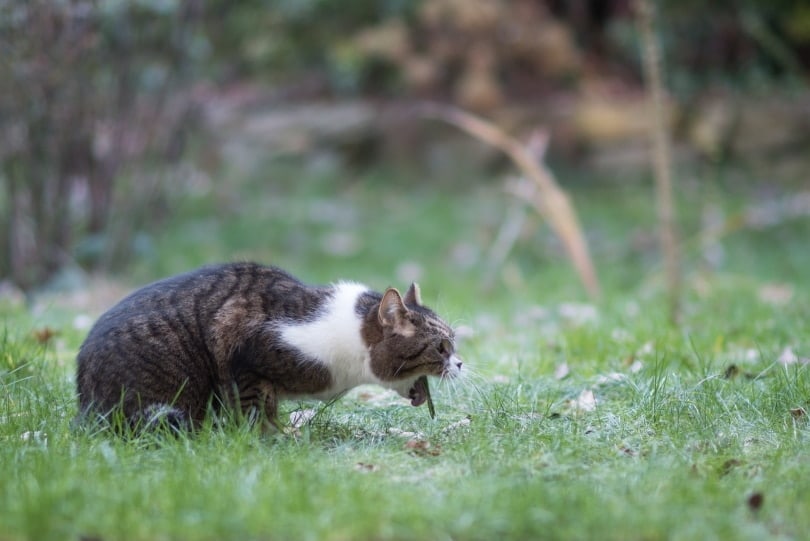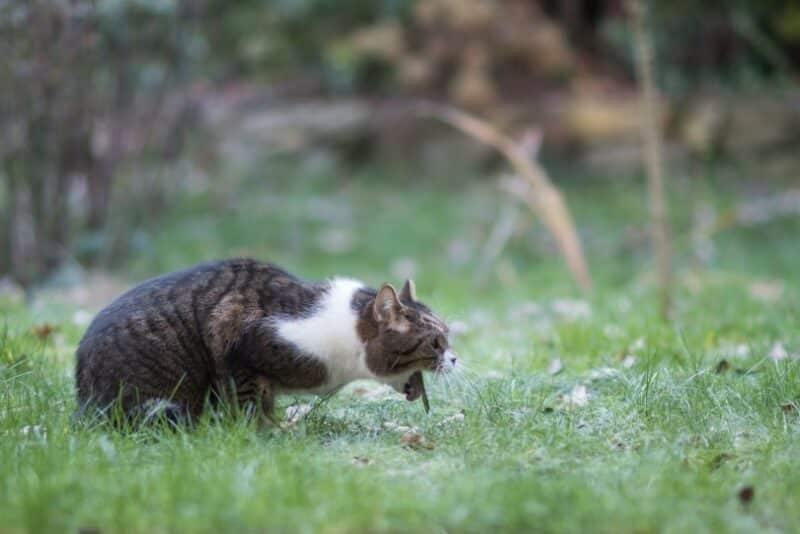Occasional vomiting is not necessarily an issue, but in some cases, it can be a sign of a health problem. Vomiting represents the active evacuation of food from the stomach and is a clinical sign that can appear in many pathologies. It’s not a diagnosis in itself, so occasional vomiting from a healthy cat does not necessarily indicate a problem, especially when the vomit consists of trichobezoars (furballs). It is normal for cats to swallow hair while grooming.
Vomiting becomes a serious problem when it is persistent or contains blood. Vomiting blood can occur for multiple reasons, including gingivitis, rodenticide poisoning, ulcers, foreign bodies, and parasites. If your cat vomits blood, contact the veterinarian immediately.

The 10 Reasons Why Cats Vomit Blood
Your cat may vomit blood along with the stomach contents or only blood. Vomited blood can be bright red (fresh) or dark red (old). Also, it can be in large quantities or streaky.
Here are the most common causes of cats vomiting blood.
1. Prolonged Severe Vomiting
When your cat vomits strongly or repeatedly for a long time, the lining of the esophagus and/or stomach becomes inflamed, and the small blood vessels can break. This can lead to streaks of blood in your cat’s vomit.
If your cat vomits repeatedly, take them to the vet immediately because it can lead to dehydration, which can be fatal. Clinical signs of dehydration in cats include:
- Lethargy
- Weakness
- Poor appetite
- Dry mucous membranes
- Sunken eyes
2. Gingivitis or Severe Dental Disease
Gingivitis means inflammation of the gums and often represents the early stage of periodontal disease. When periodontal disease occurs, the gums swell and may bleed. If this phenomenon coincides with vomiting, it may seem that your cat is vomiting blood.
The clinical signs of periodontal disease in cats may include:
- Excessive salivation
- Bleeding gums
- Avoiding food consumption
- Discomfort to touch
To prevent periodontal disease and gingivitis, you need to brush your cat’s teeth every day and take them to the vet for a dental cleaning once a year.
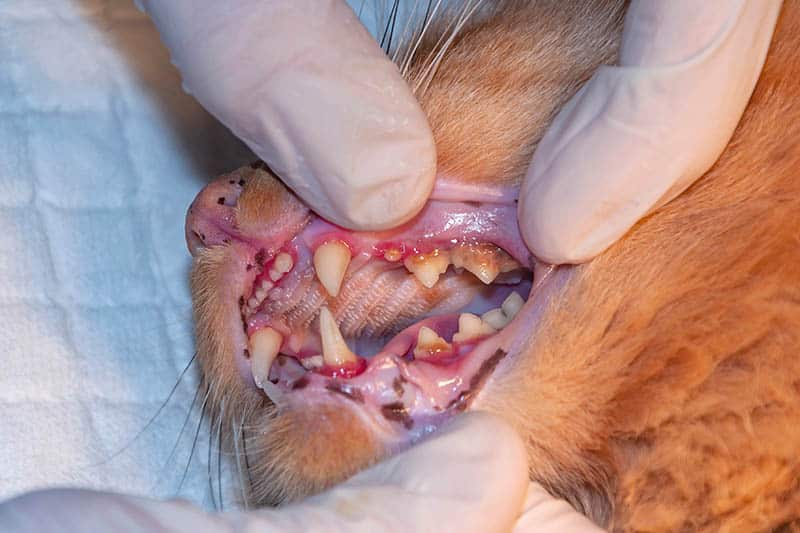
3. Ulcer
If there are dark granules in your cat’s vomit, like coffee grounds, it means your pet is eliminating blood, which can be a sign of a gastric ulcer. The dark color of the blood tells us that it is old and has been in the stomach for a while.
The causes of gastric ulcers are multiple and can include:
- Cancer
- Internal parasites
- Adverse effects of nonsteroidal anti-inflammatory drugs
- Renal failure
- Foreign bodies
If your cat suffers from a gastric ulcer, you will notice the following clinical signs:
- Excessive salivation
- Dark stools (due to the digested blood)
- Loss of appetite
- Pale mucous membranes
- Weight loss
- Lethargy
- Stomach pain
If you suspect that your cat’s vomiting blood is a consequence of a gastric ulcer, take them to the vet for an evaluation.
4. Rodenticide Poisoning
Unlike with dogs, poisoning with anticoagulant rodenticides in cats is rare. That said, anticoagulant rodenticides are considered antagonistic substances to vitamin K (antihemorrhagic vitamin). These substances are used to get rid of pests and can dilute (thin) the blood, causing internal bleeding.
Clinical signs of anticoagulant rodenticide poisoning in cats may include:
- Dark, tarry stool
- Nosebleeds
- Vomiting blood
- Urine with blood
- Lethargy
- Pale mucous membranes
- Breathing difficulties
- Coughing
Ingestion of rat poison is an emergency, and you should take your pet to the vet immediately. Fortunately, this type of poisoning has an antidote, which is vitamin K.
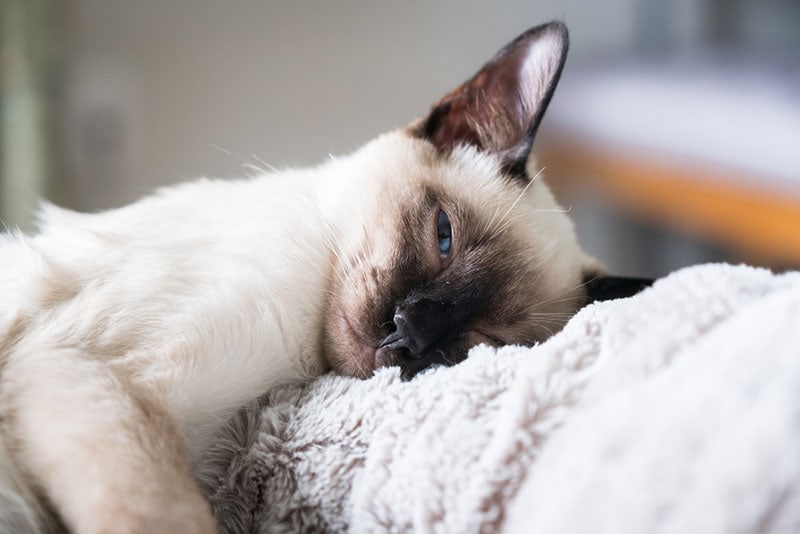
5. Internal Parasites (Roundworms)
Roundworms are intestinal parasites that infest cats and other animals. They are found in the small intestine and feed on the nutrients that your cat eats. Two types of roundworms can infest cats:
- Toxocara cati is the most common type of roundworm, often found in kittens. The larvae can be ingested when feeding on their mother’s milk. Rodents or other carriers represent other sources of infestation. In this case, cats ingest the eggs of T. cati along with the prey. The eggs hatch into larvae once they reach the digestive system, then turn into adult worms.
- Toxascaris leonina is less common in cats. This parasite has a simple life cycle. Cats become infected by ingesting food or water that is contaminated with eggs. Once the eggs reach the digestive tract, they hatch into larvae and then turn into adults.
In massive infestations, your cat may vomit worms. Signs of roundworm infestation in cats include:
- Vomiting, sometimes with blood or parasites
- Weight loss
- Lethargy
- Swollen abdomen
- Diarrhea
- Constipation
Deworming your cat is the only treatment that will rid them of internal parasites.
6. Foreign Objects
Foreign objects, especially sharp ones (bone shards, toys, etc.), can cause the vomiting of blood. These objects can damage the esophagus or other parts of the gastrointestinal tract. Also, when they reach the intestines, they can cause an intestinal blockage, which can be fatal. Signs of a foreign body in a cat include:
- Nausea
- Vomiting, sometimes with blood
- Diarrhea/constipation
- Abdominal pain
- Loss of appetite
- Depression
- Lethargy
Ingesting a foreign body represents a medical emergency, and your cat should be taken to the vet immediately.
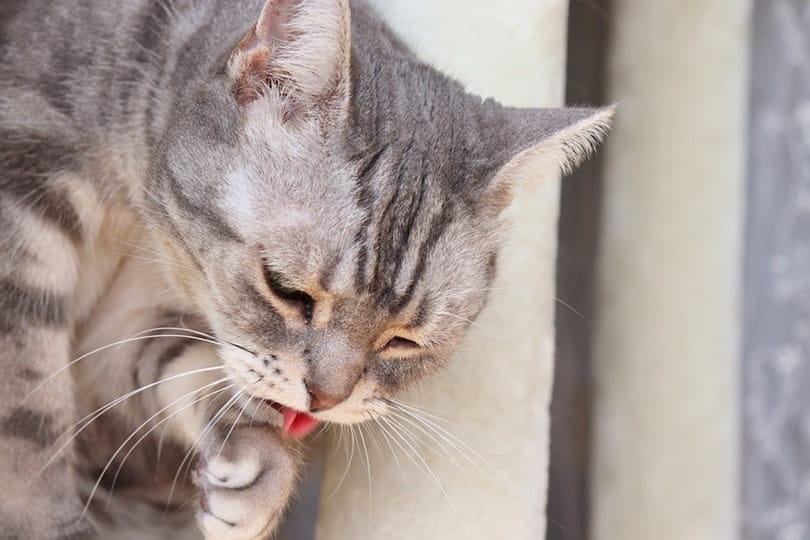
7. Inflammatory Bowel Disease (IBD)
IBD is a disorder in which one or more segments of the gastrointestinal tract are invaded with inflammatory cells (white blood cells). Over time, the inflammation reduces the absorption capacity of the intestine, and your cat loses weight. IBD is the main cause of chronic diarrhea and vomiting in cats.
Clinical signs include:
- Chronic vomiting, sometimes with blood
- Diarrhea
- Fatigue
- Gas
- Weight loss
- Depression
- Abdominal pain
Unfortunately, the causes are not fully elucidated, and the treatment is non-specific, which is why your cat will have this problem throughout their life.
8. Side Effects of Certain Drugs
In rare cases, certain medicines can cause stomach ulcers, which can lead to vomiting blood. These drugs suppress the defense mechanisms of the stomach and can cause mucosal ulceration. An example is anti-inflammatory drugs, which should not be administered on an empty stomach.
That said, cases of gastric ulcers caused by the administration of anti-inflammatory drugs are rare in cats. To remedy the problem, the treatment must be interrupted, and your cat should be taken to the vet.
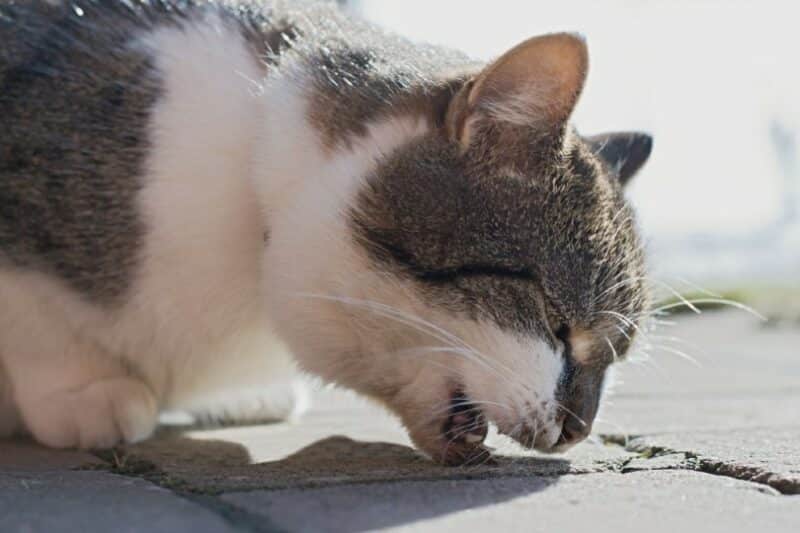
9. Problems With Blood Clotting
A blood-clotting problem that can be found in cats is hemophilia. Hemophilia A, or factor VIII deficiency, is a common hereditary blood disorder in cats. There is also Hemophilia B, or factor IX deficiency, but this condition is rarely found in cats. Clinical signs are common and may include:
- Prolonged bleeding after a surgical intervention
- Internal bleeding
- Excessive bleeding
- Vomiting blood
If your cat shows these clinical signs, you must take them to the vet immediately. In massive bleedings, hospitalization and blood transfusion may be needed.
10. Cancer
Tumors that appear in the digestive tract or nose can bleed, which means blood can occur in your cat’s vomit. Your cat may swallow the blood, which will go into the stomach and then be eliminated when they vomit.
Also, certain cancers outside the gastrointestinal tract (e.g., mast cell tumors) can lead to gastrointestinal bleeding, and your cat can end up throwing up blood.
Depending on the location of the tumor, the following clinical signs may occur:
- Breathing with difficulty
- Abundant nasal discharge
- Difficulties in mastication/swallowing
- Bloating
- Diarrhea
- Constipation
- Lack of appetite
- The presence of appetite, but with your cat refusing to eat
- Abdominal pain
- Weight loss
If your cat shows signs of cancer or you notice a lump under their skin, take them to the vet immediately for a proper diagnosis and treatment.
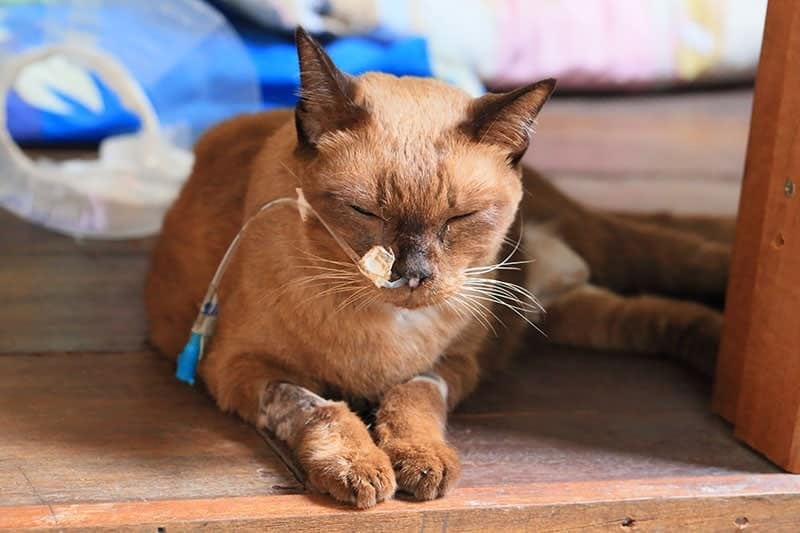

Conclusion
If your cat vomits from time to time (hair, food, or gastric juice), there is no cause for concern. But when the vomiting is repeated or your cat vomits blood, it is a sign that something is wrong with them, and they should be taken to the vet immediately. The causes of vomiting blood in cats are multiple and may include cancer of the gastrointestinal tract, hemophilia, prolonged vomiting, internal parasites, anti-inflammatory drugs, gastric ulcer, or IBD. The clinical signs that you may notice (besides vomiting blood) will depend on the condition that your cat is suffering from. Weight loss, lack of appetite, hypersalivation, nausea, diarrhea, or lethargy may also occur.
Vomiting is not a diagnosis but a clinical sign. So, if you notice your cat vomiting (especially repeatedly and over a long period), take them to the vet immediately because it can lead to dehydration, which can be fatal.
Featured Image Credit: Nils Jacobi, Shutterstock

